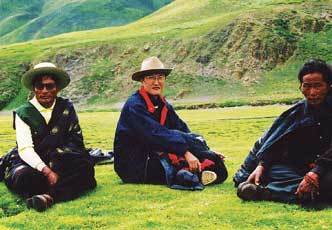As he shivered in a noble lord's kitchen 50 years ago, Gelek, a Tibetan serf, thought he and his mother would spend their whole lives there doing unpaid work; he could never imagine that he would go on to become the country's first Tibetan PhD, since he had been indoctrinated that "the only hope of a good life was in the afterlife".
Gelek is now deputy director of the China Tibetology Research Center and travels frequently between Beijing and Chengdu, supervising doctoral candidates in these cities. He has participated in international academic exchanges and has met the Dalai Lama's personal representative three times.
"I would still be a serf but for the democratic reform," Gelek says. "The reform gave me the opportunity to become a PhD and an academic."
On January 19, 2009, the People's Congress of the Tibet Autonomous Region endorsed a bill to designate March 28 as Serf Emancipation Day to mark the date on which 1 million Tibetan serfs were freed 50 years ago.
From 'talking cattle' to freemen with land
Born in 1950 in a village of the Ganzi Tibetan Autonomous Prefecture in southwest China's Sichuan Province, Gelek does not know when his birthday is or who his father was, for he was born as a serf and was considered private property, as were his mother and sister.
 |
|
Gelek with Tibetan herdsmen |
"We were at the bottom of feudal system. We had no land, nothing but the clothes we wore, which were also our quilts and sheets for the night. We lived in the corridors of the lord's house. We were made to work for him one generation after another and were regarded as 'talking cattle'."
Apart from ghosts, temples and forced labor, there was nothing in Gelek's childhood consciousness. "We were brainwashed from birth with the message that the only hope of a good life was in the afterlife."
Democratic reform took place in Gelek's hometown in 1956, three years before the reform in Tibet. For the first time he and his folks had their own land and houses, the right to speak and the social status of free people.
From 30 Tibetan characters to 400 thousand-word dissertations
In feudal Tibet, the only way to raise one's social status was to become a lama, so Gelek's mother implored the lord to allow 5-year-old Gelek to take part in religious services where he could learn the scriptures. "The price of my education was the entire family's unpaid labor," Gelek murmurs.
"We followed the old lamas' chanting but we didn't know what the scriptures meant, and we were punished if we chanted wrong." The 30-character Tibetan alphabet was all he learnt in six months.
The 1956 reform brought a primary school to his hometown and Gelek was able to start a systematic study of both Tibetan and Chinese. Then, after three years at junior high, he was admitted to the vocational class of the Southwest University for the Nationalities, where he studied Tibetan translation for four years.
In 1978, Gelek entered the Institute of Ethnology and Anthropology of the Chinese Academy of Social Sciences to study the history of China's ethnic groups, particularly those of Tibet.
Gelek received his doctorate from Sun Yat-sen University in 1986, becoming a PhD in anthropology. Afterwards, he joined the country's first research center of Tibetology.
From 1988 to 1989, Gelek taught at Indiana University and UCLA as a visiting scholar, during which time he encountered the Dalai Lama's elder brother Thubten J. Norbu, who was also teaching at Indiana University. One day they had a confrontation.
"Thubten said the Hans and Tibetans were incompatible, like water and fire. I refuted him by saying good and bad people weren't distinguished by nationality. There were good and bad people in all nationalities. He couldn't get the upper hand over me." Gelek told a Xinhua News Agency reporter.
"I was a serf before the democratic reform whereas he was one of the reincarnated Buddhas, who, together with a few aristocrats, owned all the land and forced us serfs to work for them," Gelek said. "But now I am a scholar of the People's Republic and an exchange scholar of the American Academy of Sciences."
Gelek visits Tibet every year. "To apply the theory of sustainable development to Tibet and step up modernization without destroying the culture and environment is one of the main objects of our research."
In July 2008, Gelek had talks with the Dalai Lama's personal representative during which he described the country's first state level Tibetology Museum which is under construction.
When the museum is complete in near feature, around 2000 precious cultural artifacts and historical relics will be displayed to the public. The theme is "Tibet, a place we yearn for", Gelek says.
(China.org.cn by Maverick Chen, February 16, 2009)